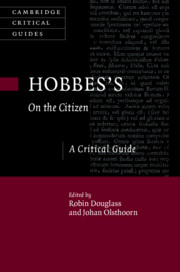Book contents
- Hobbes’s On the Citizen
- Cambridge Critical Guides
- Hobbes’s On the Citizen
- Copyright page
- Contents
- Contributors
- Acknowledgments
- Abbreviations
- Introduction
- Chapter 1 Excavating On the Citizen
- Chapter 2 Hobbes and Aristotle on the Foundation of Political Science
- Chapter 3 All the Mind’s Pleasure: Glory, Self-Admiration, and Moral Motivation in On the Citizen and Leviathan
- Chapter 4 The Right of Nature and Political Disobedience: Hobbes’s Puzzling Thought Experiment
- Chapter 5 Motivation, Reason, and the Good in On the Citizen
- Chapter 6 Property and Despotic Sovereignty
- Chapter 7 Sovereignty and Dominium: The Foundations of Hobbesian Statehood
- Chapter 8 Corporate Persons without Authorization
- Chapter 9 Hobbes on Love and Fear of God
- Chapter 10 “A Rhapsody of Heresies”: The Scriptural Politics of On the Citizen
- Chapter 11 On the Citizen and Church-State Relations
- Chapter 12 Sovereign-Making and Biblical Covenants in On the Citizen
- Bibliography
- Index
- Cambridge Critical Guides
Chapter 1 - Excavating On the Citizen
Published online by Cambridge University Press: 15 November 2019
- Hobbes’s On the Citizen
- Cambridge Critical Guides
- Hobbes’s On the Citizen
- Copyright page
- Contents
- Contributors
- Acknowledgments
- Abbreviations
- Introduction
- Chapter 1 Excavating On the Citizen
- Chapter 2 Hobbes and Aristotle on the Foundation of Political Science
- Chapter 3 All the Mind’s Pleasure: Glory, Self-Admiration, and Moral Motivation in On the Citizen and Leviathan
- Chapter 4 The Right of Nature and Political Disobedience: Hobbes’s Puzzling Thought Experiment
- Chapter 5 Motivation, Reason, and the Good in On the Citizen
- Chapter 6 Property and Despotic Sovereignty
- Chapter 7 Sovereignty and Dominium: The Foundations of Hobbesian Statehood
- Chapter 8 Corporate Persons without Authorization
- Chapter 9 Hobbes on Love and Fear of God
- Chapter 10 “A Rhapsody of Heresies”: The Scriptural Politics of On the Citizen
- Chapter 11 On the Citizen and Church-State Relations
- Chapter 12 Sovereign-Making and Biblical Covenants in On the Citizen
- Bibliography
- Index
- Cambridge Critical Guides
Summary
On the Citizen is both the second version of Hobbes’s political theory, a precursor of Leviathan, and part of a scientific project titled “The Elements of Philosophy.” The chapter disentangles how the work relates to these different contexts. It examines the development of Hobbes’s political thinking by comparing On the Citizen with an earlier text (The Elements of Law), giving particular attention to his discussions of the state of nature, the political covenant, and governmental accountability. Turning to the second context, the chapter tracks the evolution of Hobbes’s thinking away from purely formal, definitional science. On the Citizen lays out the problem of the contestability of foundational concepts in moral and political philosophy and tries out a solution in the form of a concept of “right reason.” Alongside that ultimately unsatisfactory line of thinking, Hobbes also advances an empirical approach to science of a more political nature. As indicated by the title, On the Citizen was framed to cover political subjects, an empirical focus that propelled Hobbes’s development as a political theorist. Leviathan is a master work in political theory because it was preceded by On the Citizen.
Keywords
Information
- Type
- Chapter
- Information
- Hobbes's On the CitizenA Critical Guide, pp. 12 - 30Publisher: Cambridge University PressPrint publication year: 2019
